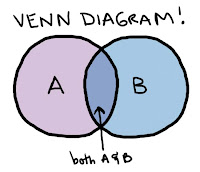
There is an extremely evident contrast between the two tales that we have read so far, The Miller's Tale and The Knight's Tale. In the latter of the two, we see a chivalrous and noble story about the love, courage, and tenacity. On The Miller's Tale we see a vulgar and indecent story filled with sexual references. Both of these stories contrast quite clearly in that the narrators are both obviously of different classes, come from different places, and undoubtedly have more differences than similarities.
One of the few similarities that both stories have is that they both treat the subject of the art of enchanting and seducing. In the The Knight's Tale we can see two charming, courteous, and well-bred men who are able to attract Emelye, a beautiful and proper woman. On The Miller's Tale, we see a variety of characters such as John, a stupid old carpenter; Nick, a scheming and mischievious student; and Absolon, a gullible lovesick parish clerk.
It's interesting to see how these personalities contrast and how the narrarators differ so much in personalities and backgrounds. I'm very interested in seeing how the novel progresses and meet new characters, each with their own set of interesting and unique qualities.


